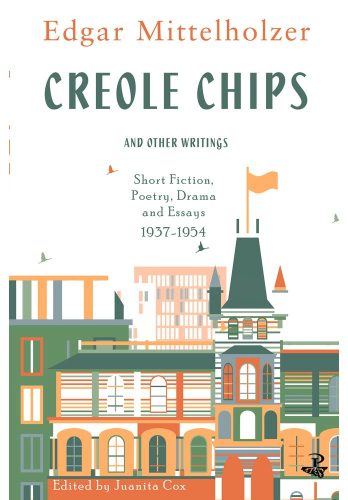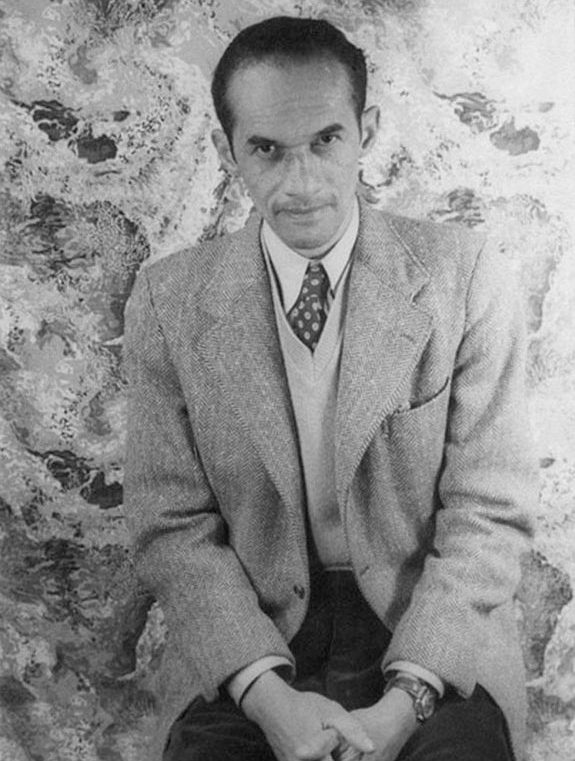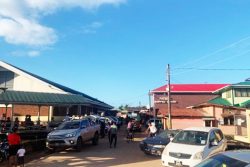 We are pleased to present a small sample to give a picture of the poetry of Edgar Mittelholzer (1909 -1965), the prolific Guyanese writer best known for his several novels. Although honoured as a master craftsman and leading West Indian writer of fiction the totality of his output includes shorter works ranging from short stories or short fiction, poetry, drama and essays. While many of his novels, published between 1941 and 1965, and a few short stories, are quite acclaimed, and place him among the outstanding artists, this volume of shorter works is not so well known.
We are pleased to present a small sample to give a picture of the poetry of Edgar Mittelholzer (1909 -1965), the prolific Guyanese writer best known for his several novels. Although honoured as a master craftsman and leading West Indian writer of fiction the totality of his output includes shorter works ranging from short stories or short fiction, poetry, drama and essays. While many of his novels, published between 1941 and 1965, and a few short stories, are quite acclaimed, and place him among the outstanding artists, this volume of shorter works is not so well known.
Many were self published while others appeared in Kyk-Over-Al, or in Bim, among other places, such as, very interestingly, the Pioneer Press that published The Adding Machine in Jamaica in 1954, but they were recently collected by Juanita Cox and published in one volume by Peepal Tree Press in 2018. Readers are indebted to Cox and Jeremy Poynting for Creole Chips and Other Writings, edited by Cox.
 The poetry is a particularly significant volume of work for what they tell us about the author, but more for their place in Guyanese poetry, especially the verses of the 1930s and 1940s. Mittelholzer’s Corentyne Thunder (1941), his very first published novel, is distinguished as the founder of social realism in Guyana, but as a poet he was one of the best and among a very few poets of distinction in the country.
The poetry is a particularly significant volume of work for what they tell us about the author, but more for their place in Guyanese poetry, especially the verses of the 1930s and 1940s. Mittelholzer’s Corentyne Thunder (1941), his very first published novel, is distinguished as the founder of social realism in Guyana, but as a poet he was one of the best and among a very few poets of distinction in the country.
Originality and the confidence of an individual voice are qualities that stood out in an age characterised by imitation. “For Me The Backyard” expresses a revolt against social middle class norms and manners as well as it does in its approach to landscape, flora and activities. There is a determination to focus what is local, if not indigenous, what is proletarian and folk, with a tendency to align these with sincerity and truth as against shallowness and dishonesty characteristic of the higher classes.
The back-yard is identified with the working class and the folk. In fact there was a movement that developed among the drama that was called “back-yard” because it depicted the lives of the urban poor and unemployed and those belonging to an underworld of “hustlers”, the yard came to represent a social reality of struggle against a society led by colour and class with strong distinctions in economic wealth and social class against want and under-privilege.
By choosing to identify with the less privileged Mittelholzer gives the artist a role of naming things that identified with the local conditions whether they were social entertainment and choices or they were types of food or to the natural or cultivated landscape. Note the corresponding satirical humour in “Meditations of A Man Slightly Drunk” in the presentation of the intellectuals and radicals who met regularly for readings of poetry and discourses as well as disputes on subjects of the arts. Rum was at the centre of these gatherings all the way into the 1970s, according to various witnesses who described them in a few publications.
Mittelholzer’s approach in these poems are akin to his radical artistic types such as the hero in My Bones and My Flute”. But while these few poems reveal a particular brand of the more progressive poets in British Guiana in the 1930s and 1940s, Mittelholzer went on to explore many other contrasting types in his collection of novels.
MEDITATIONS OF A
MAN SLIGHTLY DRUNK
I came, and they drunkened me lightly
With a medley of liquors.
There was falernum,
There were literary disagreements,
Poetical dissonances,
Yes, but chiefly there was rum.
They talked to me of stanzas,
The ancient and very modern.
They broached even painting,
Haggled about form,
Over Epstein concorded with reverence.
Yes, but chiefly there was rum.
We jabbered of pendulums,
Pendulums that swung like my vision,
They gesticulated and bawled –
Ranting about matter,
Eulogizing imagery,
Yes, but never forgetting the rum.
We slashed at Swinbourne,
And we justly kicked old Kipling.
We grimaced dreadfully at Pater,
How we hacked poor Donne,
And sniffed at Rupert Brooke!
Though always, always, mind,
There was rum!
FOR ME – THE BACKYARD
Play your carnival, play your masque,
Dance with your Country Club set,
Hey, jump at your midnight fete:
For these things I’ll never ask –
Take them all and leave for me
The back-yard scene at dusk:
The haze of blue wood-smoke,
Morning mist among mango leaves
And the nancy-story fantasies
That the cries of kiskadees
From long, long ago evoke.
Keep your calypsos and your steel-bands!
Wiggle your hips and waggle your hands!
For me the good soft tingling dew
And mottled shadows beneath a guava tree,
The glimmer, the dim mysterious hue,
Of coconut fronds spider hands
Immobile, immeshed in the filigree,
The plaited pattern, of sarapple and plum,
Breadfruit and mango – and the perpetual hum
Of all the insects hidden in jumbie-lands:
The magic a waning moon can weave; set free.
Let the saxaphones quark and wail!
And pianos thump a jiving jumbled tale!
For me the ruby warmth in sunshine,
The haphazard tracery of this wild vine,
Coconuts a-sizzling,
Water vapour in the air,
A rerd cock crowing, the clatter of a pail,
The swift white drift
Of clouds in the cool trade wind,
A whiff of rice and salt-fish cooking
And of earth, dark, dank and bare.
Keep your serge suit, collar and tie!
Asparagus, lentils, your high-falutin apple pie!
Keep your respectability; I don’t care!
For me the sun, the dew, the leaves, the wind –
And why should I even spurn
These little ragged clumps of fern
And the rickety latrine standing near
The old grey-trunked tamarind!
Assuredly for me – the naïve back-yard
Where bajak ants, without hypocrisy, troop by
And no gentlemen politely smile and lie.
AFTERNOON REFLECTIONS
If we could fly through time –
Five, ten years in the sough of a breath inhaled –
And light atop the silvered hills
We try in vain to climb;
If we could dust away the sundown red
And smear upon the east the sunrise pink,
The blare of ochre, the morning tints
Of the dreamed day: the yearned for hour;
If one could shut one’s eyes
And in a pregnant humming second
Open them again upon huge splashes of gold:
Barrells of silver and ivory jewels
And a panorama of undulating green
Dark brown streams and dimly whispering wooded haunts
And small red bungalows: just a few
If we could make things cease to linger:
Bombs and armies and dictators,
Guns, U-boats and the winging squadrons –
The Panzer units, too –
All at the gesture of one slim finger.
Edgar Mittelholzer







